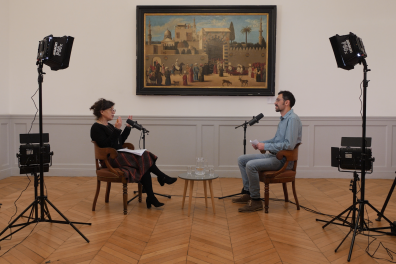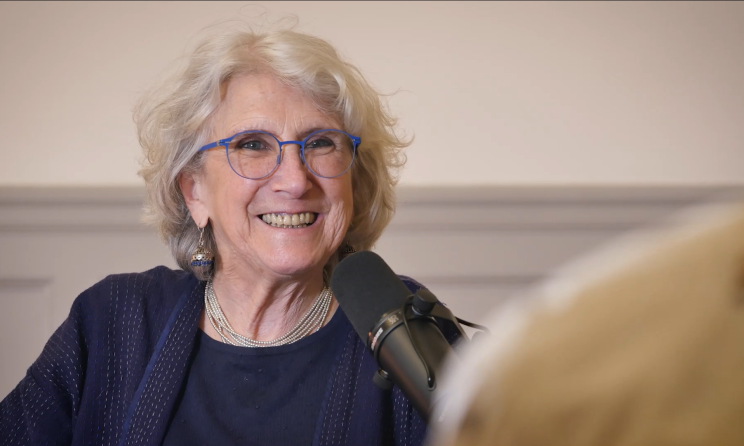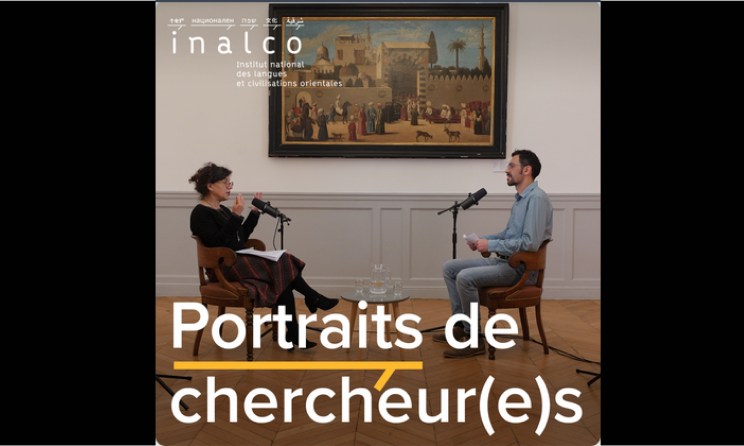Entretiens PEA - Portraits of researchers in Areal Studies

The PEA collection
These long-form interviews with experienced researchers offer an immersion into a field of research through the accounts they give of their career paths and fields.
The main objectives of this program are to:
- Contribute to the discovery of the great diversity of the world's languages, societies and cultures and to its enlightened, respectful and responsible appreciation;
- Value the academic career and work of researchers specializing in the studies of a given cultural area ;
- To publicize the specificity of Inalco's vision for apprehending a cultural area - a vision that considers in-depth knowledge of local languages to be a sine qua non condition for theoretical research and practical expertise in the lato sensu textual productions and heritages (oral and written, verbal and non-verbal) of the world's civilizations ;
- Constitute a living, freely accessible scientific heritage of research on world languages, societies and cultures;
- Participate in Inalco's initiatives in favor of open science, for research and teaching of world languages and civilizations.
This audiovisual collection joins the multimodal data set offered by the LaCAS platform. It feeds into a new type of publication, the focus, which based on interviews with a researcher, highlights research carried out in the field of areal studies.
Watch the video and listen to the podcast
A new portrait presented every month in the News section of our site, available in two versions:

Video version
Available on the open archive HAL

Podcast version
Available on listening platforms Spotify, Deezer, Apple Podcast and Amazon Music
Videos already available
- Meeting Marie-Christine Bornes-Varol, specialist in the Judeo-Spanish area (CERMOM, Inalco)
- Meeting Matteo de Chiara, specialist in Pashto language and Iranian philology (CeRMI)
- Meeting Gilles Guiheux, specialist in the socio-history of China and Taiwan (CESSMA)
- Meet Jean-François Huchet, specialist in the economy of China and comparative economic systems in Asia, president of Inalco
- Meeting Yitskhok Niborski, specialist in Yiddish language, literature and civilization, president of the Maison de la culture yiddish
- Meeting San San Hnin Tun, specialist in Burmese linguistics
- Meeting Mark Van de Velde, specialist in Bantu languages (LLACAN)
- Meeting Anne Bayard-Sakai, specialist in modern and contemporary Japanese literature (IFRAE)
- Meeting Sophie Vassilaki, specialist in modern Greek linguistics (SeDYL)
- Meeting Michel Vieillard-Baron, specialist in poetry (waka) and poetics of classical Japan (IFRAE)
- Meet Michel Bozdémir, specialist in Turkish language, literature and history (CERMOM)
- Meeting Thomas Pellard, specialist in the languages of Japan (CNRS-CRLAO)
- Meet Laurent Sagart, specialist in archaic Chinese and Chinese dialectology (CRLAO)
- Meeting Jean-Jacques Thibon, specialist in Islamology (CERMOM)
- Meeting Dominique Samson Normand de Chambourg, specialist in Siberian studies (CREE)
- Meeting Mourad Yelles, specialist in Maghreb literature (LACNAD)
- Meeting Alessandro Guetta, specialist in Jewish intellectual history and literature in the modern era (CERMOM)
- Meeting Philippe Erikson, specialist in Amazonian Amerindian societies (Université Paris Nanterre)
- Meeting Bernard Hourcade, geographer and Iran specialist (CeRMI)
- Meeting Isabelle Bril, specialist in Austronesian languages (LACITO)
- Meeting Capucine Boidin Caravias, specialist in Tupi-Guarani languages (IHEAL-CREDA, Université Sorbonne Nouvelle)
- A la rencontre d'Emmanuel Poisson, historien de la bureaucratie-imperiale au Vietnam et des savoirs lettrés (IFRAE, UPC)
- A la rencontre de Danielle Elisseeff, sinologue (Ecole du Louvre, CECMC-EHESS)
- Meeting Irène Bellier, anthropologist specializing in indigenous peoples
- Meeting Géraud Magrin, geographer specializing in Africa (Université Paris 1 - Panthéon-Sorbonne)
- Meeting Marie Roué, specialist in arctic and subarctic peoples (CNRS)
- Meeting Françoise Robin, specialist in Tibetan language, literature and cinema (IFRAE)
- Meeting Rémy Bazenguissa-Ganga, africanist socio-anthropologist (EHESS)
- Meeting Marc-Antoine Pérouse de Montclos, specialist in armed conflicts in English-speaking African countries (IRD)
- Meeting Gilles Bataillon, sociologist, specialist in contemporary Latin America (CESPRA, EHESS)
- Meeting Cécile Vidal, historian specializing in colonial empires and slavery in the Atlantic worlds (EHESS)c
- Meeting Marie-Pierre Rey, historian specializing in Russia (Université Paris 1 - Panthéon-Sorbonne)
- Meeting Anaïd Donabédian-Démopoulos, Western Armenian linguist (SeDYL)
- Meeting Michael Lucken, historian and art historian, specialist in contemporary Japan (IFRAE)
- Meeting Véronique Dupont, demographer specializing in India (IRD, CESSMA)
- Meeting Enrique Aliste Almuna, geographer specializing in Chile (Université Paris 1 Panthéon-Sorbonne)
- Meeting Gilles Dorronsoro, professor of political science, specializing in contemporary conflicts (Université Paris 1)